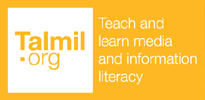

Additional Resources
In addition to the resources offered on the TALMIL platform, teachers interested in media literacy education can find on this page the best teaching resources in English and local languages to teach young people how to be informed and responsible as they navigate the media universe.
IN ENGLISH
These 5 teaching tools include teaching guides, online curricula, videos, and useful links.
1 – Media and Information Literacy and Intercultural Dialogue course (MOOC by UNESCO)
This open-access MOOC was designed by UNESCO in partnership with Athabasca University. It offers 10 units that teach the basic concepts of media and information literacy:
• Understanding media and information literacy
• Intercultural dialogue
• Freedom of expression
• The many roles of media in modern life
• Gender representation and stereotypes in the media
• The challenges and opportunities of media for youth
• Using new technology for social action
2 – Media and information literacy curriculum for teachers (UNESCO)
This curriculum for teachers is a full teaching programme for instructors of media literacy. It aims to reach millions of young people and empower them to acquire key MIL skills that are necessary for the citizenry to flourish.
The guide is divided into two parts. The first part gives a general framework of the objectives and skills MIL aims to teach. The second part contains detailed and specific modules to address the basic concepts of media literacy with young people.
3 – Media Information Literacy for Teachers (UNAOC)
This website provides teachers with course modules and practical activities in media literacy that are adaptable to different languages and local contexts for each country. The platform ultimately seeks to promote media literacy to the largest possible audience worldwide in order to make tangible article 19 of the Universal Declaration of Human Rights, which states that ‘everyone has the right to freedom of opinion and expression; this right includes the freedom to hold opinions without interference and seek, receive, and impart information and ideas through any media regardless of frontiers’.
4 – E-Media Education Lab
E-Media Education Lab is a platform designed for media literacy educators to put innovative teaching strategies to use. The website provides 10 MIL training scenarios that can be downloaded as-is or customised by users to meet their specific teaching needs. With the input of more than 350 MIL experts, this platform can help any teacher come up with their own curriculum.
5- 10 resources to boost student media literacy
This website shows you 10 organisations that provide open access resources online, including tips, videos, lesson plans, and curricula in media and information literacy.
IN REGIONS
ALBANIA
1 – Media literacy teaching manual for schools
This manual, published by the Albanian Media Institute in 2011 with support from the Open Society Foundation Albania (OFSA) seeks to teach students about media and the uses thereof.
The Albanian Media Institute is Albania’s main organisation for journalism and media literacy education.
2 – Media and Information Literacy: Reinforcing Human Rights, Countering Radicalisation and Extremism (UNESCO)
This Albanian translation provided by the Albanian Media Institute is a relevant reference point to initiate discussion and offer perspectives to stakeholders seeking to apply MIL as a tool to counter violent extremism.
The Albanian Media Institute is Albania’s main organisation for journalism and media literacy education.
3 – Manual for Media Training in Schools
This manual, published in Albanian by the IDMC, aims to train young people to be discerning of media outlets and content, understand context, and recognise any disinformation and fake news they may encounter.
The Institute for Democracy, Media, and Culture (IDMC) is an independent, non-profit, and non-governmental organisation based in Tirana that inspires and supports projects with an interdisciplinary approach to study, understand, and promote the development of democratic values and the role and impact that media and culture can play both locally and abroad.
BOSNIA AND HERZEGOVINA
4 – Handbook for Journalists Teaching Media Literacy
This handbook, published by Mediacentar Sarajevo, is intended for journalists looking to pass on their knowledge and experience on media literacy to schoolchildren and young people. The focus is on teaching and learning methods that actively involve students so they can learn through journalists’ experience, questioning, role-play, and inference. Ideas for hands-on activities for students presented in this handbook can be easily adapted for children both in primary and secondary schools.
Mediacentar Sarajevo is an organisation that supports the development of independent and professional journalism in Bosnia and Herzegovina through training, publications, media research, audio-visual productions, and cultural events.
The handbook was created as part of the regional project ‘Media for Citizens – Citizens for Media’, funded by the European Union to develop media literacy education and information in Albania, Bosnia-Herzegovina, North Macedonia, Montenegro, and Serbia. It is a joint production with multiple local members of SEENPM (the South East European Network for Professionalization of Media) and has different regional language versions.
NORTH MACEDONIA
5 – Trainer’s Manual for Media and Information Literacy
This manual, published by the Macedonian Institute for Media, aims to help future media and information literacy instructors to plan their training courses in a simple and interesting way. It is intended for NGO workers, educators looking to promote MIL in schools, and journalists. Each module comes with a list of exercises and teaching resources to use, and most activities can be adapted to different audiences.
The Macedonian Institute for Media (MIM) is a non-governmental, non-political, and non-profit organisation. MIM enables free and easy access to media literature, up-to-date resources for professional development and education in the area of media.
The manual was created as part of the regional project ‘Media for Citizens – Citizens for Media’, funded by the European Union to develop media literacy education and information in Albania, Bosnia-Herzegovina, North Macedonia, Montenegro, and Serbia. It is a joint production with multiple local members of SEENPM (the South East European Network for Professionalization of Media) and has different regional language versions.
SERBIA
6 – Media literacy basics: manual for journalists
The goal of this publication, developed as part of the ‘Media literacy campaign’, is to encourage critical reception of media content, highlighting the difference between information and entertainment and between professional and non-professional journalism in Serbia.
In 2013, the Media Coalition (consisting of the Independent Journalists’ Association of Serbia (NUNS), the Journalists’ Association of Serbia (UNS), the Independent Journalists’ Association of Vojvodina (NDNV), the Association of Independent Electronic Media (ANEM), and the Association of Local Independent Media (Local Press)) launched a ‘Media Literacy Campaign’ with the aim of assessing how media are perceived and how well the roles of media and media culture are understood amongst Serbia’s young and elderly populations. This was done through a series of activities and contributed to the development of an analytical approach to media content.






